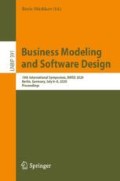Abstract
To build successful products, the developers have to adapt their product features and business models to uncertain customer needs. This adaptation is part of the research discipline of Hypotheses Engineering (HE) where customer needs can be seen as hypotheses that need to be tested iteratively by conducting experiments together with the customer. So far, modeling support and associated traceability of this iterative process are missing. Both, in turn, are important to document the adaptation to the customer needs and identify experiments that provide most evidence to the customer needs. To target this issue, we introduce a model-based HE approach with a twofold contribution: First, we develop a modeling language that models hypotheses and experiments as interrelated hierarchies together with a mapping between them. While the hypotheses are labeled with a score level of their current evidence, the experiments are labeled with a score level of maximum evidence that can be achieved during conduction. Second, we provide an iterative process to determine experiments that offer the most evidence improvement to the modeled hypotheses. We illustrate the usefulness of the approach with an example of testing the business model of a mobile application.
This work was partially supported by the German Research Foundation (DFG) within the Collaborative Research Center “On-The-Fly Computing” (CRC 901, Project Number: 160364472SFB901).
Access this chapter
Tax calculation will be finalised at checkout
Purchases are for personal use only
References
Apel, S., Batory, D., Kästner, C., Saake, G.: Feature-Oriented Software Product Lines. Springer, Heidelberg (2013). https://doi.org/10.1007/978-3-642-37521-7
Bland, D.J., Osterwalder, A.: Testing Business Ideas. Wiley, Hoboken (2020)
Chesbrough, H.: Business model innovation: opportunities and barriers. Long Range Plan. 43(2–3), 354–363 (2010). https://doi.org/10.1016/j.lrp.2009.07.010
Fagerholm, F., Sanchez Guinea, A., Mäenpää, H., Münch, J.: The RIGHT model for Continuous Experimentation. J. Syst. Softw. 123, 292–305 (2017). https://doi.org/10.1016/j.jss.2016.03.034
Gottschalk, S., Rittmeier, F., Engels, G.: Intertwined development of business model and product functions for mobile applications: a twin peak feature modeling approach. In: Hyrynsalmi, S., Suoranta, M., Nguyen-Duc, A., Tyrväinen, P., Abrahamsson, P. (eds.) ICSOB 2019. LNBIP, vol. 370, pp. 192–207. Springer, Cham (2019). https://doi.org/10.1007/978-3-030-33742-1_16
Gottschalk, S., Rittmeier, F., Engels, G.: Hypothesis-driven adaptation of business models based on product line engineering. In: International Conference on Business Informatics (CBI). IEEE (2020). https://doi.org/10.1109/CBI49978.2020.00022
Lindgren, E., Münch, J.: Raising the odds of success: the current state of experimentation in product development. Inf. Softw. Technol. 77, 80–91 (2016). https://doi.org/10.1016/j.infsof.2016.04.008
McGrath, R.G.: Business models: a discovery driven approach. Long Range Plan. 43, 247–261 (2010). https://doi.org/10.1016/j.lrp.2009.07.005
Melegati, J., Wang, X.: QUESt: new practices to represent hypotheses in experiment-driven software development. In: International Workshop on Software-intensive Business (IWSiB), pp. 13–18. ACM (2019). https://doi.org/10.1145/3340481.3342732
Melegati, J., Wang, X., Abrahamsson, P.: Hypotheses engineering: first essential steps of experiment-driven software development. In: RCoSE/DDrEE, pp. 16–19. IEEE (2019). https://doi.org/10.1109/RCoSE/DDrEE.2019.00011
Olsson, H.H., Bosch, J.: The HYPEX model: from opinions to data-driven software development. In: Bosch, J. (ed.) Continuous Software Engineering, pp. 155–164. Springer, Cham (2014). https://doi.org/10.1007/978-3-319-11283-1_13
Olsson, H.H., Bosch, J.: Towards continuous customer validation: a conceptual model for combining qualitative customer feedback with quantitative customer observation. In: Fernandes, J.M., Machado, R.J., Wnuk, K. (eds.) ICSOB 2015. LNBIP, vol. 210, pp. 154–166. Springer, Cham (2015). https://doi.org/10.1007/978-3-319-19593-3_13
Peffers, K., Tuunanen, T., Rothenberger, M.A., Chatterjee, S.: A design science research methodology for information systems research. J. Manag. Inf. Syst. 24(3), 45–77 (2007). https://doi.org/10.2753/MIS0742-1222240302
Ries, E.: The Lean Startup: How Today’s Entrepreneurs Use Continuous Innovation to Create Radically Successful Businesses. Crown Business, New York (2014)
Samavi, R., Yu, E., Topaloglou, T.: Strategic reasoning about business models: a conceptual modeling approach. Inf. Syst. E-Bus. Manag. 7(2), 171–198 (2009). https://doi.org/10.1007/s10257-008-0079-z
Teece, D.J.: Business models, business strategy and innovation. Long Range Plan. 43(2–3), 172–194 (2010). https://doi.org/10.1016/j.lrp.2009.07.003
van Lamsweerde, A.: Goal-oriented requirements engineering: a guided tour. In: International Symposium on Requirements Engineering, pp. 249–262. IEEE (2001). https://doi.org/10.1109/ISRE.2001.948567
Author information
Authors and Affiliations
Corresponding author
Editor information
Editors and Affiliations
Rights and permissions
Copyright information
© 2020 Springer Nature Switzerland AG
About this paper
Cite this paper
Gottschalk, S., Yigitbas, E., Engels, G. (2020). Model-Based Hypothesis Engineering for Supporting Adaptation to Uncertain Customer Needs. In: Shishkov, B. (eds) Business Modeling and Software Design. BMSD 2020. Lecture Notes in Business Information Processing, vol 391. Springer, Cham. https://doi.org/10.1007/978-3-030-52306-0_18
Download citation
DOI: https://doi.org/10.1007/978-3-030-52306-0_18
Published:
Publisher Name: Springer, Cham
Print ISBN: 978-3-030-52305-3
Online ISBN: 978-3-030-52306-0
eBook Packages: Computer ScienceComputer Science (R0)

